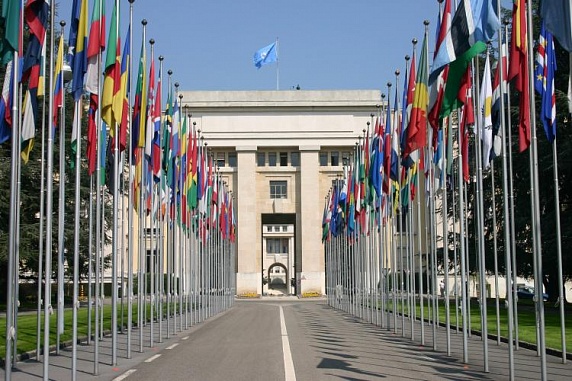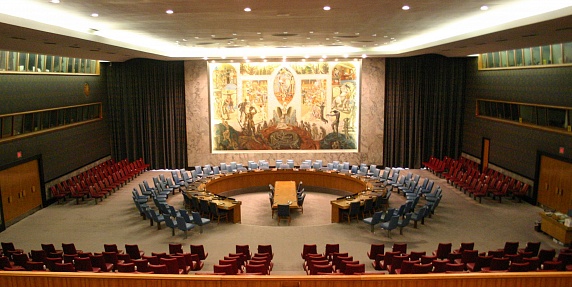 ONU
ONU
Foreign Minister Sergey Lavrov’s interview with the Mexican newspaper Excélsior published on November 17, 2017
Question: What is Mexico to Russia? Are there plans for more ambitious bilateral economic and political relations? What are the possibilities for signing a trade agreement in the short or medium term?
Sergey Lavrov: Mexico is Russia’s traditional partner in Latin America and the Caribbean (LAC), relations with which go centuries back. This year we will mark two dates, the 127th anniversary of our diplomatic relations together with 20 years since the signing of the Declaration on Principles for Relations and Cooperation between our states.
The consistent development of cooperation with Mexico is an integral part of our policy for strengthening interaction with the LAC countries. President of Russia Vladimir Putin and President of Mexico Enrique Peña Nieto discussed possibilities for building bilateral cooperation in various spheres during a meeting on the sidelines of the BRICS summit in Xiamen, China in September this year.
Our peoples are bound together by friendship, trust and sympathy, and our humanitarian and cultural ties include numerous contacts between our citizens. Back in the early 20th century, famous Russians, including ballet dancer Anna Pavlova, poet Vladimir Mayakovsky, film director Sergey Eisenstein as well as scientist Nikolai Vavilov visited Mexico. Russian ethnographer Yury Knorozov is famous for deciphering the Maya script. Russians love works by the unique Mexican Muralists Diego Rivera, Jose Clemente Orozco and David Alfaro Siqueiros.
Last year, Russian-Mexican trade amounted to $1.4 billion. We are implementing large investment and infrastructure projects. Mexico’s Interjet owns 22 Sukhoi Superjet 100 passenger liners. We have taken note of positive trends in our energy cooperation where the Russian parties are the state-owned Rosatom and the privately owned LUKOIL. We welcome the energetic work of our Mexican partners in Russia. In particular, Nemak opened an automobile components plant in the Ulyanovsk Region in September 2015, and Gruma International Food launched production in Russia in September 2017. Of course, our trade and investment ties have much more potential. The Russia-Mexico Mixed Commission on Economic, Commercial, Scientific-Technical Cooperation and Marine Navigation is contributing to their development. There are good cooperation prospects in aircraft manufacturing, shipbuilding, chemicals and pharmaceuticals, marine equipment, power generation, automobile manufacturing, railway equipment and agriculture.
Dialogue between our business quarters is very important. We would like Mexican representatives to be more active at the St Petersburg International Economic Forum, the Eastern Economic Forum in Vladivostok, the International Forum of Technological Development in Novosibirsk, the INNOPROM International Industrial Fair in Yekaterinburg, as well as the Russian Energy Week.
In October, Industry and Trade Minister Denis Manturov together with representatives from over 50 Russian companies attended the Mexican Business Summit in San Luis Potosi. We hope the contacts they have established there will produce practical results soon.
Work is ongoing on a long-term programme of trade, economic, scientific and technical cooperation. The draft of this programme has been forwarded to our Mexican partners for coordination. We hope to be able to sign this document in the near future. It is also obvious that broader business interaction can facilitate the signing of a visa free travel agreement in the interests of our people.
Russia and Mexico are actively cooperating on the international stage, including at the UN, the G20, APEC plus other international venues. We have been working consistently to promote international relations that are based on international law, non-interference in the internal affairs of sovereign states, as well as the exclusively political and diplomatic solution to crises and conflicts.
I hope that the upcoming visit to Russia by Foreign Secretary Luis Videgaray Caso between November 16-17 will help strengthen the multifaceted Russian-Mexican relations.
Question: Mexico and Russia are both in the sights of Washington now, and both countries’ diplomatic relations with the United States have become strained. Can this be described as an opportunity to strengthen relations between Mexico and Russia?
Sergey Lavrov: Relations with any country are valuable to us, per se. We develop them regardless of changes in the political situation. This is fully applicable to our cooperation with Mexico. We hope that long-term Russian-Mexican ties will continue to develop on the basis of equality, mutual benefit and respect for each other’s interests. No matter what relations either country may have with the United States, Russia is always open to cooperation with Mexico on the above principles.
Question: Are Mexican elections of interest to Russia? Does it matter to you who will assume the presidential office in Mexico next year?
Sergey Lavrov: We are interested in strengthening cooperation with Mexico as an active and independent international player. We note with satisfaction that a strengthening of Russian-Mexican ties enjoys broad support among the Mexican public and in the country’s political circles. We hope to preserve and increase the accumulated capital of our fruitful partnership through concerted efforts.
As for elections, they are an internal affair for Mexico. We will develop relations with any elected president. This brings to mind a quote from your great political and state leader, the national hero of Mexico, Benito Juarez, who said: “The principle of non-intervention is one of the first obligations of governments; it boils down to respect for the freedom of peoples and for the rights of nations.” (El principio de no intervencion es una de las primeras obligaciones de los gobiernos, es el respeto debido a la libertad de los pueblos у a los derechos de las naciones). Russia has always been committed to this principle.
Question: Russia has pledged to comply with the Paris Agreement, so why has it put off its ratification? Carbon dioxide emissions, which are a major factor in climate change, have hit new record levels in 2016. Besides, the other BRICS countries have ratified this agreement.
Sergey Lavrov: To begin with, Russia is not putting off or delaying the ratification of the Paris Agreement. We believe this document provides a reliable framework for a lasting solution to the climate change problem.
Russia contributed to drafting this agreement. President of Russia Vladimir Putin attended the Paris Climate Change Conference in 2015. Deputy Prime Minister of Russia Alexander Khloponin was one of the first officials to sign the agreement in New York in April 2016. We officially welcomed the enforcement of this agreement in November 2016.
Russia has a responsible attitude to its international obligations. Careful preparations are underway for the ratification of the Paris Agreement. Under the Action Plan adopted by the Government in November 2016, a decision will be discussed in the first quarter of 2019.
Our national contribution to the Paris Agreement will be the reduction of greenhouse gas emission to 70 per cent of the 1990 level by 2030. This means that Russia will maintain emissions at the same level for 35 years, thereby compensating for the increase of emissions in other countries and regions. We plan to attain this goal by introducing innovative energy-saving technology, enhancing the energy efficiency of our economy and developing renewable and clean energy.
Russia is providing assistance to help mitigate any climate impact on developing economies. This is why the Climate Change Window has been established at the Russia-UNDP Trust Fund for Development. A multimillion dollar project has been launched to help 14 small island states strengthen their climate resilience. We provide considerable financial assistance to the Fiji Presidency of the 23rd Conference of the Parties to the UN Framework Convention on Climate Change (COP23).
Question: Next year Russia will host the 2018 FIFA World Cup. With the threat of terrorist attacks by ISIS, can you guarantee the safety of the players and visitors?
Sergey Lavrov: First of all, I would like to congratulate Mexican fans on the incontestable victory of their national team in qualification matches for the 2018 FIFA World Cup. I am sure that your team will provide interesting, spectacular football.
We are working comprehensively to prepare for the first World Cup to be held in Russia. Of course, we are using the experience of the large-scale sporting events we have held before, including the 2014 Winter Olympics in Sochi, which has been declared the best games in Olympic history, as well as the Confederations Cup matches we hosted in June and July of this year, in which the Mexican national team took part.
Our top priority is to ensure maximum comfort and safety for players and fans. Russian law enforcement agencies are taking all the necessary measures towards this. In particular, they have created interdepartmental operational headquarters to coordinate their efforts towards preventing the threat of terrorism.
We are seriously concerned about preventing disorderly behaviour. We have developed close cooperation with our foreign partners to minimise these risks, including within the framework of the Council of Europe Convention on an Integrated Safety, Security and Service Approach at Football Matches and Other Sports Events, which is open to all states. The national football information points stipulated in this Convention give access to a secure internet site with information about delinquent fans and the so-called risk groups, as well as other useful information.
I am sure that the upcoming World Cup will be a real festival of sports and an unforgettable experience for participants and guests. I would like to use this occasion to invite Mexican football fans to come to Russia so as to cheer their team, to get to know Russia better and to enjoy the hospitality and friendliness of Russians.









